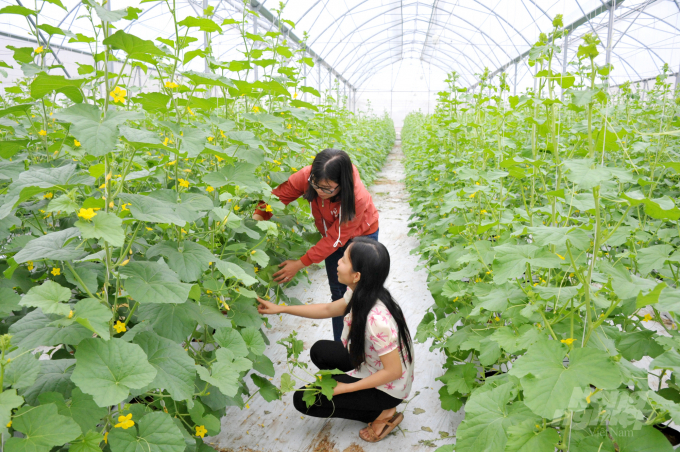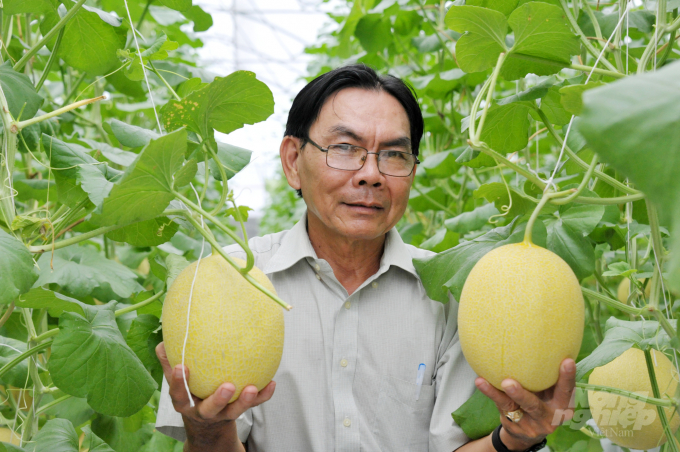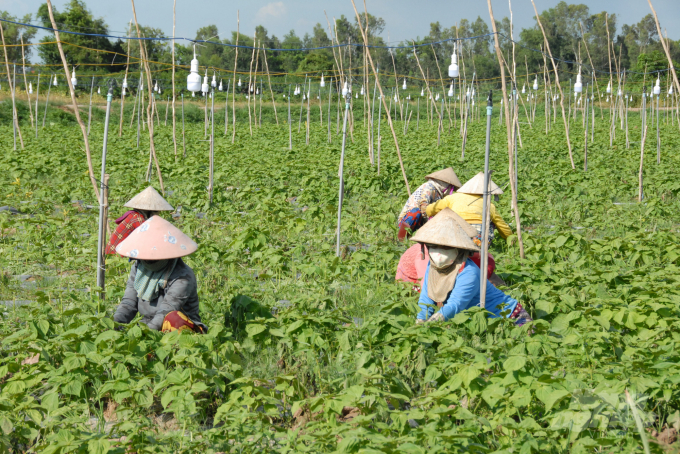June 19, 2025 | 01:17 GMT +7
June 19, 2025 | 01:17 GMT +7
Hotline: 0913.378.918
June 19, 2025 | 01:17 GMT +7
Hotline: 0913.378.918
Organic agricultural products must first be safe for the producers, their families then they must be safe for the consumers before earning long-term trust. These are the passionate teaching of old farmer Nguyen Van Muoi, who specializes in growing organic green-skinned pomelo in Dong Hamlet, Tan Binh Commune, Chau Thanh District (Dong Thap).

The agricultural sector in the Mekong Delta is gradually developing following an organic direction. Photo: Le Hoang Vu.
Mr. Nguyen Van Muoi shared that his family has cultivated over 1 hectare of pomelo following VietGAP standards for 4 years. From being reliant on fertilizers and chemical pesticides, he gradually switched to entirely organic fertilizers and biological pesticides. Products are cultivated with higher quality and productivity compared to before. However, he is still concerned about a distributor for the final products, to avoid being equated with ordinary ones.
When he first started out in organic agriculture and growing melons in greenhouses, Mr. Tran Minh Buu in An Phu district, An Giang province had many sleepless nights because the quality of his final products was disappointing; and it took 1 to 2 years to research a new product of his own. The biggest difficulty lies in accessing capital, transferring technology, support policies and especially finding output for the final products.
According to Mr. Buu, investment in organic agriculture can be extremely beneficial, despite being initially labor intensive and more expensive compared to conventional agricultural production. Furthermore, organic producers must be absolutely honest in order to have a market reputation. Mr. Buu's organic cantaloupe production model currently has a stable link with output businesses; it will be convenient for him to expand the organic agricultural area in the future.
Mr. Nguyen Van Phong, owner of Can Tho Farm in Binh Thuy district, Can Tho city has engaged in organic agriculture for over two years. However, in the process of production, he has encountered numerous difficulties, challenges in terms of investment capital, market access, etc. After overcoming these difficulties, his products are being favored and chosen by consumers.

Investment in organic agriculture, although initially labor intensive and more expensive compared to conventional production, brings long-term benefits. Photo: Ngoc Thang.
Mr. Nguyen Van Phong shared: There is no success without challenges and obstacles. Organic agriculture takes time to prosper and in that 2 years, he only wanted to break even without even considering about profits. The area of agricultural land is gradually reduced so farmers were forced to adapt to high-tech agriculture and apply organic agricultural production to ensure profits.
"Hopefully organic agriculture will have breakthroughs in the coming years, creating more impressions with each product. Organic farmers always hope to have cooperation from the State, especially with regards to policies on capital, infrastructure and land support for safe investment", said Mr. Phong.
According to Mr. Tran Thai Nghiem, Deputy Director of Can Tho City Department of Agriculture and Rural Development, safe organic agricultural products are not only gradually gaining the trust of consumers, but these products have also been reinforcing our agricultural sector's position within the region as well as on the international scale.
Although there are currently difficulties and challenges, this is an indispensable direction for the agricultural sector in the Mekong Delta, especially when issues concerning food safety and hygiene have become the most important criterion for consumers. With new production models and approaches, it is slowly changing the mindset of small, fragmented, unconnected, market-oriented production, with focus on quantity instead of quality.

High prices of materials and fertilizers are pressuring farmers, but they also pose an opportunity for the development of organic agricultural production. Photo: Le Hoang Vu.
According to Mr. Nghiem, organic agriculture seems simple in theory, but in practice, every farmer encounters many difficulties and obstacles including capital sources, policies and application of science and technology, and so on. Can Tho City has begun to form concentrated production zones following organic methods. Although the area is not large, development and expansion are expected to happen in the next few years.
Mr. Pham Van Le, Chairman and Director of Nhon Nghia Longan Cooperative in Phong Dien District, Can Tho City said: The cooperative currently has 29 members, with a longan cultivation area of over 22.5 hectares, with the main variety being Ido longan. This is a longan variety with excellent yield, productivity and almost no disease; this variety can also be cultivated to produce fruit all year round.
For over 2 years, members of the cooperative have also produced following VietGAP standards to produce quality and safe agricultural products. However, due to the dependence on chemical pesticides and fertilizers, production costs are high, especially when the price of many chemical fertilizers has recently increased 2 to 3 times compared to previous years. Therefore, increasing the use of organic fertilizers and biological pesticides is cheap and effective for farmers. Subsequently, the use of chemical fertilizers and pesticides has drastically declined, reducing production costs as well as ensuring product safety.
“It is estimated that if the production processes are executed appropriately in the direction of safety and reduced chemical fertilizers, farmers can reduce production costs by at least 20%. Thanks to organic longan cultivation, for the last longan crop, Nhon Nghia Longan Cooperative has made a profit of nearly 200 million VND/hectare/crop. As a result, the production of organic longan can increase profit by 10 to 15% compared to conventional production", said Mr. Le.

Organic production has helped many farmers increase profits by 10 to 15% compared to conventional production. Photo: Ngoc Thang.
According to Mr. Pham Van Quynh, former Director of Can Tho City Department of Agriculture and Rural Development, developing organic agriculture in the Mekong Delta requires the cooperation and dedication from businesses in forming models along the value chain. Without the businesses' support, it will be very difficult to sell products and establish a brand.
Accordingly, the State needs to have suitable policies to support businesses to invest in organic agriculture through preferential credits and land rent, with focus on leasing unpolluted land. Additionally, businesses should be encouraged to invest in the production of organic fertilizers, biological fertilizers, micro-organisms, and biological pesticide preparations to serve organic production on a large scale in the future.
Translated by Nguyen Hai Long
/2025/06/17/3942-2-143243_548.jpg)
(VAN) Recently, in Sweden, the Secretary of the Binh Dinh Provincial Party Committee presented the Investment Registration Certificate for the 'Polyester Fabric Recycling Complex' project to SYRE Impact-AB Company.
/2025/06/12/3721-2-202745_83.jpg)
(VAN) TH made an impression at Seoul Food 2025 with its line of natural beverages, paving the way for Vietnamese food products to enter the South Korean market.

(VAN) Soc Trang's success in rice exports stems from a strategy of developing fragrant and specialty rice cultivation areas and standardizing production toward low-emission practices.
/2025/06/11/1311-5-120811_839.jpg)
(VAN) The pig farming industry is facing the challenge of comprehensive restructuring to meet requirements for quality, safety, traceability, and market expansion both domestically and for export.

(VAN) Vietnam considers participating in ALGROALBA in order to expand agricultural production, coordinate the assessment and effective exploitation potential land.
/2025/06/05/5314-1-184727_407.jpg)
(VAN) From seemingly worthless fish scales and skin, enzymes and lactic ferments can transform by-products into peptides, opening a sustainable, effective business direction and elevating Vietnamese seafood.

(VAN) TTC AgriS and IFC signed a strategic partnership to develop a sustainable agricultural value chain, aiming to achieve the Net Zero target by 2035.